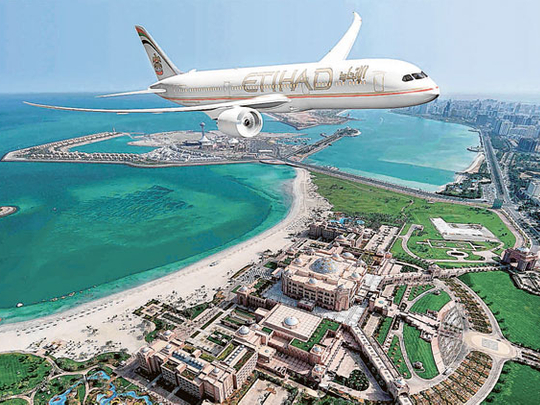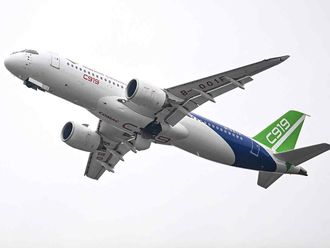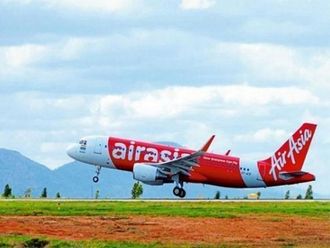
Abu Dhabi: Eight years after it was founded, Etihad Airways became profitable in 2011, earning a net profit of $14 million (Dh51.4 million) for the full year. The Abu Dhabi-owned airline said yesterday it achieved $4.1 billion in revenue last year, a 36 per cent increase over $2.98 billion in 2010.
The record results, audited by accounting firm KPMG, included earnings before interest, tax, depreciation, amortisation and rentals (EBITDAR) of $648 million, exceeding the airline's 2011 target to break even, Etihad said.
The full-year EBIT (earnings before interest and tax) was $137 million.
President and CEO James Hogan said Etihad is targeting $5 billion of revenues in 2012 despite tough econ-omic conditions in the market.
Asked about the airline's profitability target for 2012, Hogan said: "With regard to the profitability we haven't published what the actual profit number is, but we certainly intend to grow the profit this year over 2011."
He added: "Five years ago we said we would be profitable by 2011. Despite the global financial crisis, continued high oil prices, regional instability and natural disasters, we have delivered."
Analysts, meanwhile, believe 2012 will be a tough year.
"This year will be a difficult year globally. The International Air Transport Association contends that when global growth is below 2 per cent, airlines around the world fall into loss," said Andrew Charlton, managing director of the Europe-based strategic advisory, government and public affairs firm Aviation Advocacy.
"That said, Etihad's strategy is good — one that does not depend on any one home market but on having the equipment and the flexibility to connect various markets. The signs are good, but there is no room for complacency," he told Gulf News.
Saj Ahmad, chief analyst at StrategicAero Research, meanwhile, is more positive, saying that Etihad will return small profits in 2012 largely based on its expanding fleet and passenger numbers.
"We should expect the airline to perhaps double what it made in 2011 despite fuel and staff cost pressures going forward but overall it's a signal that now it has indeed made a profit, it will work hard to ensure, sustain and build on it for this year," he said.
Added Charlton: "The airline's strategy depends on an integrated regulatory policy and that includes airports and air traffic control. That is the next big challenge for Etihad."
Meanwhile, the carrier's strongest markets in 2011 included Australia, Southeast Asia and the Americas, according to Hogan.
"China is starting to grow," he said.
Asked if the airline would consider listing, Hogan told reporters at the press conference: "At this stage we will continue to run as a private company. We have not been given any direction from the board with regard to any form of IPO [initial public offering] or flotation."
The carrier said it flew 8.3 million passengers last year, up 17 per cent on the year before, and is aiming to carry 10 million passengers in 2012, according to Hogan.
"And we will aim for strong growth again in 2012, in spite of the tough global economic environment, with a passenger traffic target of 10 million and a corresponding increase in profits," he said.
Average seat factor
Etihad recorded an average seat factor of 75.8 per cent last year, nearly two percentage points higher than the previous year's 74 per cent.
The airline's cargo arm, Etihad Crystal Cargo, increased revenues by 25.7 per cent in 2011 to $651 million as freight increased 17.8 per cent to 310,188 tonnes compared to the prior year's 263,313 tonnes.
Etihad added five routes last year to its global network, including Bengaluru, the Maldives, Seychelles, Chengdu and Düsseldorf.
In addition, the airline signed eight codeshare agreements, taking Etihad Airways' codeshare partners to 35 airlines and thereby increasing its worldwide network to 269 destinations.
The most strategic of these were the two recent deals the carrier sealed with airberlin and Air Seychelles. Etihad Airways expanded its route network to 269 cities through its acquisition of a 29.1 per cent stake in the loss-making German carrier airberlin in December with an investment of €72.9 million (Dh355 million).
Pursuing its strategy to grow through acquisitions, Etihad then acquired a 40 per cent stake worth $20 million (Dh73.45 million) in Air Seychelles last month.
"We will continue our highly successful strategy of working closely with other carriers to maximise opportunities," said Hogan.
"Etihad Airways has 35 code share agreements in place, allowing us to offer services, direct or indirect, to 269 destinations, 80 destinations more than any other Gulf carrier offers."
He also said that the airberlin deal will be the carrier's most important catalyst for growth in 2012.
"It has given us instant access to Europe's largest travel market, and will have a major impact on revenues in 2012, with an expected contribution of up to $50 million," Hogan said.
Strategic partnerships
"And of course, 2011 marked the first full year of Etihad's strategic partnership with Virgin Australia, which offers 45 destinations in Australia and the Pacific, and boosted revenue by 700 per cent over what we achieved with our previous Australian airline partner."
"While Etihad's goal was just to break even, attaining a small but important profit shows that its business plan is paying off, even though it has spent heavily on investing in other airlines," analyst Ahmad said.
"And with airberlin and Air Seychelles to deliver significant revenue returns in the coming years, Etihad's growth in revenue and earnings year-on-year will continue to rise in line with passenger demand as the carrier expands its global footprint."
Meanwhile, at the end of 2011, Etihad Airways had 9,038 employees, up 15.1 per cent on 2010 (7,855), the carrier said, adding its Emiratisation scheme continued with Emiratis now making up 18 per cent of the headquarters' workforce.
Seven new aircraft are expected to join Etihad's current 64-plane fleet.
They include four Boeing 777s and three Airbus A320s. Asked if financing was in place to fund the deliveries of the planes this year and if the carrier considered Islamic financing, James Rigney, chief financial officer, told Gulf News: "We went for Islamic financing in 2007 and raised $500 million. In 2012-13, it's all about diversification. We will once again consider Islamic structures."
Dreamliner order
The carrier also recently placed a massive order for 41 Boeing 787-900 Dreamliners, of which the first is due for delivery in the fourth quarter of 2014, Hogan said.
Etihad Airways ordered 100 new aircraft and 105 options and purchase rights at the 2008 Farnborough Air Show. And to date, the airline has raised $5 billion in external fleet financing, through a portfolio of 41 financial institutions, Hogan said.
Setting off volatility in oil prices, Etihad Airways hedged around 80 per cent of its fuel costs last year at $80 a barrel oil price, Hogan said, adding that the carrier plans to hedge 77 per cent this year.
He refused to reveal prices at which the carrier hedged its fuel for 2012 but said the airline plans to hedge 50 per cent of its fuel costs in 2013 and 25 per cent in 2014.
"The airline continued its policy of fuel hedging, which has protected the airline from the volatility of oil prices," Rigney said.












